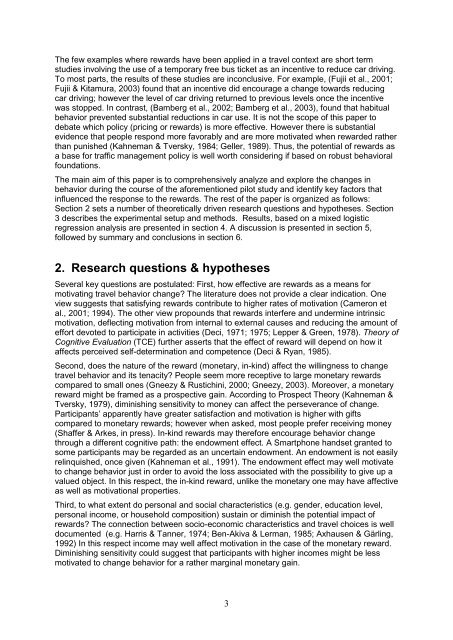Ben-Elia, E. and Ettema, D. (2011) Changing commuters' behav- ior ...
Ben-Elia, E. and Ettema, D. (2011) Changing commuters' behav- ior ...
Ben-Elia, E. and Ettema, D. (2011) Changing commuters' behav- ior ...
You also want an ePaper? Increase the reach of your titles
YUMPU automatically turns print PDFs into web optimized ePapers that Google loves.
The few examples where rewards have been applied in a travel context are short term<br />
studies involving the use of a temporary free bus ticket as an incentive to reduce car driving.<br />
To most parts, the results of these studies are inconclusive. For example, (Fujii et al., 2001;<br />
Fujii & Kitamura, 2003) found that an incentive did encourage a change towards reducing<br />
car driving; however the level of car driving returned to previous levels once the incentive<br />
was stopped. In contrast, (Bamberg et al., 2002; Bamberg et al., 2003), found that habitual<br />
<strong>behav</strong><strong>ior</strong> prevented substantial reductions in car use. It is not the scope of this paper to<br />
debate which policy (pricing or rewards) is more effective. However there is substantial<br />
evidence that people respond more favorably <strong>and</strong> are more motivated when rewarded rather<br />
than punished (Kahneman & Tversky, 1984; Geller, 1989). Thus, the potential of rewards as<br />
a base for traffic management policy is well worth considering if based on robust <strong>behav</strong><strong>ior</strong>al<br />
foundations.<br />
The main aim of this paper is to comprehensively analyze <strong>and</strong> explore the changes in<br />
<strong>behav</strong><strong>ior</strong> during the course of the aforementioned pilot study <strong>and</strong> identify key factors that<br />
influenced the response to the rewards. The rest of the paper is organized as follows:<br />
Section 2 sets a number of theoretically driven research questions <strong>and</strong> hypotheses. Section<br />
3 describes the experimental setup <strong>and</strong> methods. Results, based on a mixed logistic<br />
regression analysis are presented in section 4. A discussion is presented in section 5,<br />
followed by summary <strong>and</strong> conclusions in section 6.<br />
2. Research questions & hypotheses<br />
Several key questions are postulated: First, how effective are rewards as a means for<br />
motivating travel <strong>behav</strong><strong>ior</strong> change? The literature does not provide a clear indication. One<br />
view suggests that satisfying rewards contribute to higher rates of motivation (Cameron et<br />
al., 2001; 1994). The other view propounds that rewards interfere <strong>and</strong> undermine intrinsic<br />
motivation, deflecting motivation from internal to external causes <strong>and</strong> reducing the amount of<br />
effort devoted to participate in activities (Deci, 1971; 1975; Lepper & Green, 1978). Theory of<br />
Cognitive Evaluation (TCE) further asserts that the effect of reward will depend on how it<br />
affects perceived self-determination <strong>and</strong> competence (Deci & Ryan, 1985).<br />
Second, does the nature of the reward (monetary, in-kind) affect the willingness to change<br />
travel <strong>behav</strong><strong>ior</strong> <strong>and</strong> its tenacity? People seem more receptive to large monetary rewards<br />
compared to small ones (Gneezy & Rustichini, 2000; Gneezy, 2003). Moreover, a monetary<br />
reward might be framed as a prospective gain. According to Prospect Theory (Kahneman &<br />
Tversky, 1979), diminishing sensitivity to money can affect the perseverance of change.<br />
Participants’ apparently have greater satisfaction <strong>and</strong> motivation is higher with gifts<br />
compared to monetary rewards; however when asked, most people prefer receiving money<br />
(Shaffer & Arkes, in press). In-kind rewards may therefore encourage <strong>behav</strong><strong>ior</strong> change<br />
through a different cognitive path: the endowment effect. A Smartphone h<strong>and</strong>set granted to<br />
some participants may be regarded as an uncertain endowment. An endowment is not easily<br />
relinquished, once given (Kahneman et al., 1991). The endowment effect may well motivate<br />
to change <strong>behav</strong><strong>ior</strong> just in order to avoid the loss associated with the possibility to give up a<br />
valued object. In this respect, the in-kind reward, unlike the monetary one may have affective<br />
as well as motivational properties.<br />
Third, to what extent do personal <strong>and</strong> social characteristics (e.g. gender, education level,<br />
personal income, or household composition) sustain or diminish the potential impact of<br />
rewards? The connection between socio-economic characteristics <strong>and</strong> travel choices is well<br />
documented (e.g. Harris & Tanner, 1974; <strong>Ben</strong>-Akiva & Lerman, 1985; Axhausen & Gärling,<br />
1992) In this respect income may well affect motivation in the case of the monetary reward.<br />
Diminishing sensitivity could suggest that participants with higher incomes might be less<br />
motivated to change <strong>behav</strong><strong>ior</strong> for a rather marginal monetary gain.<br />
3

















